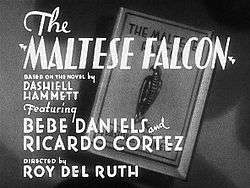MacGuffin Title
A work has a title that refers to a specific object. Because the object is so specific in the title, you know without knowing anything else about the story, that, obviously, the heroes will have to quest to find this object, or protect it from the bad guys, or recover it from the forces of evil, or destroy it somehow. This often leads to a Title Drop.
Something of a pet trope for fantasy novels and video games, (especially those with Mad Lib Fantasy Titles, but can occur elsewhere. Sometimes results in an Artifact Title if the series moves on. Can involve a Character Name and the Noun Phrase title, especially if the Noun Phrase in question is nothing more than a MacGuffin itself.
A Subtrope of Mad Lib Fantasy Title and Super-Trope of Character Name and the Noun Phrase.
Anime and Manga
- Cardcaptor Sakura has some of this, since the main character has to capture cards.
- Dragon Ball
- One Piece
- Death Note
Film
- The Maltese Falcon says almost nothing about the movie, but we kinda know what it's talking about.
- Raiders of the Lost Ark, Indiana Jones and the Temple of Doom and Indiana Jones and the Kingdom of the Crystal Skull qualify. Indiana Jones and the Last Crusade doesn't.
- The title was going to be Indiana Jones and the Holy Grail, but director Steven Spielberg didn't want people to confuse it with Monty Python and the Holy Grail (which, coincidentally, fits this trope to a T).
- The Pink Panther is, in universe, named for the valuable gem in the heist, and not for the cartoon feline that appears in the credits.
Literature
- Phillip Pullman's His Dark Materials is a trilogy of MacGuffin titles. The Subtle Knife is a particularly good case of this.
- Not in the UK, however, where the first book is titled Northern Lights.
- Crops up in The Wheel of Time. The first book is definitely one, but the best example is A Crown of Swords for combining this with Prophecy Twist - even some of the Title Drops seem to be symbolic.
- Jack Vance's The Eyes Of The Overworld.
- The Drawing of the Dark by Tim Powers references not one but two MacGuffins.
- The Chronicles of Narnia has The Silver Chair, which doesn't turn up until quite late in the book, but still counts.
- The Harry Potter series includes the titular Philosopher's Stone, Goblet of Fire, and Deathly Hallows, though the Goblet is a plot starter, not a Plot Coupon. The Chamber of Secrets also counts, as it is a MacGuffin Location.
- The Sword of Shannara.
- Memory, Sorrow, and Thorn does this recursively: Not only does the series-name refer to the three MacGuffins, but the titles for individual books (The Dragonbone Chair, The Stone of Farewell and To Green Angel Tower) all refer to various important objects.
- Maggie Furey's Artifacts Of Power series has titles like "The Harp of Winds" and "The Sword of Flame".
- Keeper of the Swords by Nick Perumov is kinda like that. It sounds like a word salad at first, but later you learn that the titular Swords are the McGuffin. The first book in this series, Diamond Sword, Wooden Sword plays the trope completely straight.
- The Dark Sword Trilogy centers around the forging and use of a powerful anti-magic sword In a World of magic users.
- The Eye of Argon.
- Alexandre Dumas père's The Black Tulip.
- Deltora Quest by Emily Rodda.
- The Chronicles of Prydain include The Book of Three and The Black Cauldron, and also the MacGuffin Location The Castle of Llyr.
- The books in the Elenium trilogy by David Eddings sound like they're this trope, but only the third book in the trilogy - The Sapphire Rose - actually fits the bill.
- The Silmarillion is Quenya for "of the Silmarils," an abbreviation of the full title Quenta Silmarillion, the Story of the Silmarils.
- The first book in the Chaos Walking trilogy, The Knife Of Never Letting Go.
- The Moonstone.
Video Games
- The Legend of Zelda is full of this trope: Ocarina of Time, Majoras Mask, The Wind Waker, Phantom Hourglass, The Minish Cap, and The Legend of Zelda Four Swords, to various extents.
- The Fire Emblem series as a whole is a case of this, as the titular object is almost always a plot-important item in the games; the only time it isn't important to the plot is in Fire Emblem Jugdral, where it is only mentioned off-hand by a certain character.
- Metal Gear
- Chrono Trigger and Chrono Cross
- Kingdom Hearts
- Geneforge
- Several titles in the Professor Layton series, such as The Diabolical Box, The Specter's Flute, and The Mask of Miracle.
Western Animation
- Bionicle: Mask of Light.
- The Sword in the Stone.
- Barbie and the Diamond Castle
